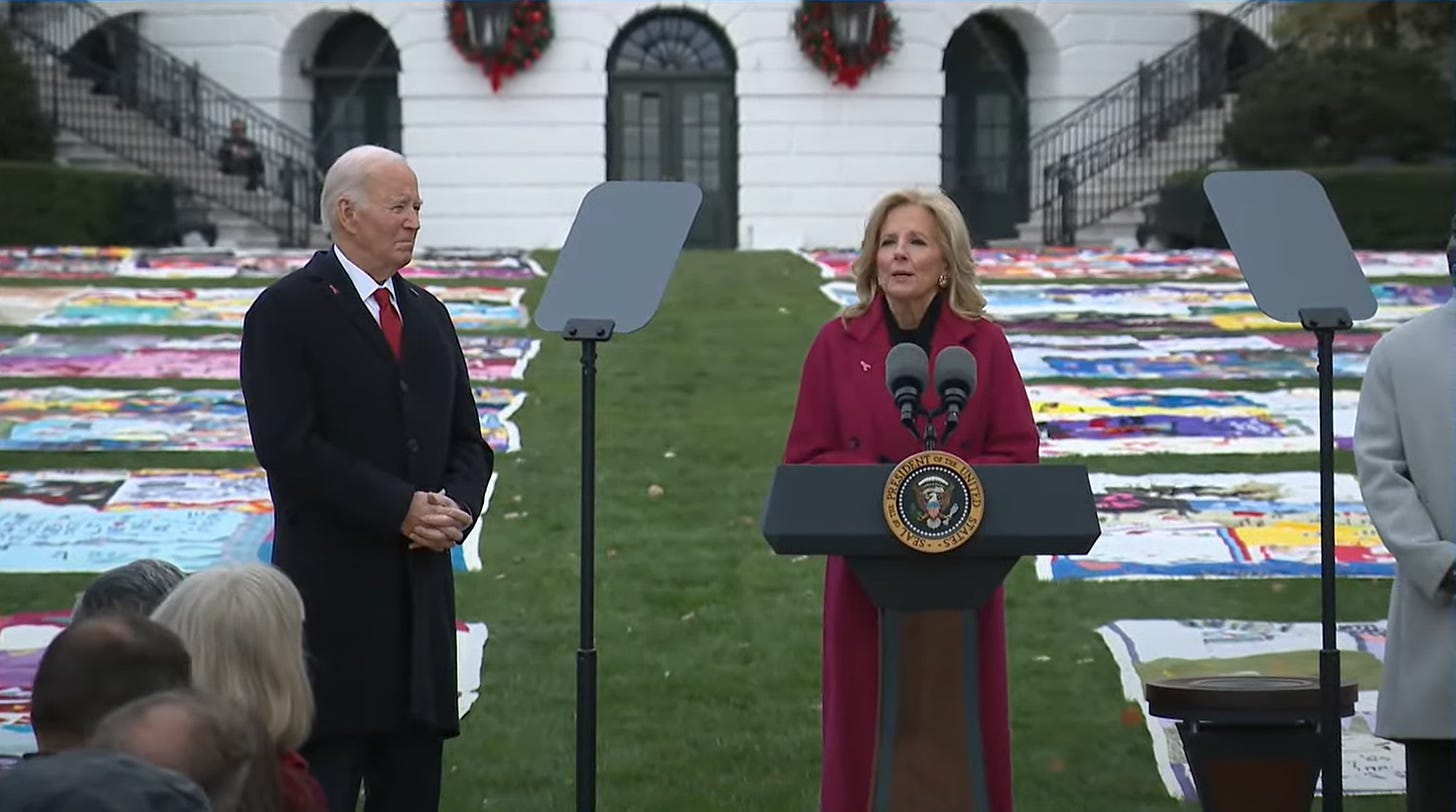President Biden announced that he has granted a full and unconditional pardon to his son, Hunter Biden, citing selective and unfair prosecution motivated by political opposition. He criticized the handling of Hunter's cases, including the collapse of a plea deal, and argued that the charges were inconsistent with typical legal practices for similar offenses. The president emphasized that Hunter has been sober for over five years despite relentless attacks and maintained that the prosecution aimed to target both Hunter and himself.
Biden expressed confidence in the justice system but condemned the influence of politics in this case, calling it a miscarriage of justice. He stated that his decision was guided by truth and fairness, emphasizing the personal and principled reasons behind his actions as a father and President.
The White House event to commemorate World AIDS Day featured remarks from First Lady Dr. Jill Biden, Jeanie White-Ginder (the mother of Ryan White), and President Joe Biden, highlighting the ongoing fight against HIV/AIDS and the personal stories of those affected. Dr. Biden spoke about the enduring impact of loss and the power of the AIDS Memorial Quilt, displayed at the White House for the first time, as a symbol of unity, compassion, and remembrance. She reflected on the mothers and families who have transformed their grief into advocacy, ensuring the world remembers their loved ones not as victims but as vibrant individuals.
Jeanie White-Ginder shared the story of her son Ryan, who contracted HIV at 13 through a blood transfusion and became a national advocate before his death. She emphasized the importance of the Ryan White CARE Act, which has saved countless lives, and expressed gratitude for bipartisan support in the fight against HIV/AIDS. White-Ginder also thanked President Biden for his decades-long commitment to this cause and recalled his empathy when they first met.
President Biden honored families, advocates, and those living with HIV/AIDS, emphasizing the significance of the AIDS Memorial Quilt as a historical and emotional marker. He highlighted the progress made through initiatives like the President’s Emergency Plan for AIDS Relief (PEPFAR), launched by President George W. Bush, which has saved millions of lives globally. Biden called on Congress to reauthorize PEPFAR for another five years and reaffirmed his administration’s commitment to ending HIV-related stigma, improving access to preventive medications, and repealing outdated HIV criminalization laws. He also announced updates to Medicaid and Medicare guidance to enhance care for people living with HIV.
The President closed by acknowledging the resilience and advocacy of the HIV/AIDS community, emphasizing that collective action has already saved countless lives and changed hearts and minds. He urged continued unity in the fight to end the epidemic, reaffirming his belief that there is no challenge the United States cannot overcome when working together. The event served as a powerful reminder of the progress made and the work still needed to achieve an AIDS-free generation.
NSC Spokesperson Sean Savett issued a statement regarding the release of a hostage video featuring American-Israeli citizen Edan Alexander, describing it as a stark reminder of Hamas's terror against civilians from various nations, including the United States. The U.S. government has been in contact with Alexander's family and emphasized that the ongoing war in Gaza and the resulting humanitarian crisis could end if Hamas agreed to release the hostages. A deal to release the hostages, halt the conflict, and expedite humanitarian assistance to Gaza is currently on the table. President Biden and the United States remain steadfast in their commitment to securing the release of all hostages, employing diplomatic efforts, sanctions, law enforcement actions, and other measures to increase pressure on Hamas. On behalf of the Alexanders and other families of hostages, the U.S. pledged to continue working tirelessly until their immediate release is achieved.
Sean Savett also released a statement addressing the ongoing situation in Syria, emphasizing that the U.S. is closely monitoring developments, particularly the collapse of Assad regime lines in northwest Syria. The instability is attributed to the Assad regime's refusal to engage in the political process outlined in UN Security Council Resolution 2254 and its reliance on support from Russia and Iran. The U.S. denies any involvement in the offensive led by Hay’at Tahrir al-Sham (HTS), a designated terrorist organization. Calling for de-escalation, the U.S. urges all parties to protect civilians and minority groups while committing to a credible political process to end the Syrian civil war through a settlement consistent with UNSCR 2254. Additionally, the statement reaffirms the U.S. commitment to safeguarding its personnel and military positions in Syria to ensure ISIS cannot resurge.
President Biden’s upcoming visit to Angola, from December 2–4, marks a historic milestone as the first-ever trip by a sitting U.S. president to the country and the first presidential visit to Africa in nearly a decade. This visit underscores the Biden administration’s commitment to strengthening U.S.-Angola relations, promoting regional cooperation, and advancing its broader U.S.-Africa strategy. The trip highlights a shift from traditional aid to a sustainable investment-focused approach, emphasizing equitable partnerships and African leadership in addressing global challenges. Central to the visit is the Lobito Trans Africa Corridor, a transformative infrastructure project connecting Angola to the Democratic Republic of Congo, Zambia, and eventually Tanzania, facilitating trade, critical mineral transport, and food security. President Biden will also spotlight significant achievements under the Prosper Africa Initiative, including $6.9 billion in U.S. deals and $2.5 billion in renewable energy investments that have positioned Angola as a hub for economic growth.
Additionally, the President will announce new initiatives such as a global health security partnership to combat infectious diseases and support for Angola’s Kwanza Corridor nomination as a UNESCO World Heritage Site. The visit will also highlight Angola’s regional leadership in mediating the eastern Democratic Republic of Congo conflict and advancing peace and security in Africa. U.S. officials stress that these efforts aim to offer African nations an alternative to Chinese investment models by prioritizing higher standards for labor, environmental stewardship, and transparency, fostering sustainable development and economic integration.
The Biden administration views this trip as a culmination of its Africa-focused policies, which include a $55 billion investment pledge made during the 2022 U.S.-Africa Leaders Summit, two-thirds of which has already been met. While some question the timing of the trip late in Biden’s presidency, officials emphasize the administration’s cumulative impact, noting bipartisan support for its Africa policy and a long-term strategy that future administrations will likely uphold. In Angola, President Biden will meet with President João Lourenço, deliver remarks on the enduring strength of U.S.-Africa partnerships, and engage with civil society, reaffirming the U.S. commitment to fostering sustainable growth and mutual prosperity across the continent.
President Biden and First Lady Dr. Jill Biden deliver remarks at an event to commemorate World AIDS Day at the White House







I love you Joe and Jill Biden and am going to miss you so much. Jill, everything you do has a lovely touch of love in it. The pair of you in the White House has brought me joy at every turn. Thank you for the past four years and for being the best President in my lifetime. God bless and keep you.
I’m glad that President Biden pardoned his son Hunter to protect him from the perverse Trump administration.